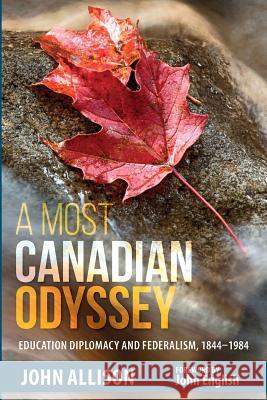A Most Canadian Odyssey: Education Diplomacy and Federalism, 1844-1984 » książka
A Most Canadian Odyssey: Education Diplomacy and Federalism, 1844-1984
ISBN-13: 9780995340602 / Angielski / Miękka / 2016 / 232 str.
A Most Canadian Odyssey: Education Diplomacy and Federalism, 1844-1984
ISBN-13: 9780995340602 / Angielski / Miękka / 2016 / 232 str.
(netto: 83,82 VAT: 5%)
Najniższa cena z 30 dni: 86,81
ok. 16-18 dni roboczych.
Darmowa dostawa!
This book was first published as a peer-reviewed monograph by Althouse Press at Western University in London, Canada. Now, the original manuscript has been reprinted for worldwide distribution. Drawing on historical research, John Allison documents the history and development of Educational Diplomacy in Canada. In setting the stage, he looks at its early development via the voyages of Egerton Ryerson, the importance of education at Confederation, and developments in the early twentieth century leading up to the 1960s. The principal focus of the book, however, takes the reader through the 1960s, the rise of the Council of Ministers of Education, Canada (CMEC), the activities of Paul GErin-Lajoie to extend Quebec's jurisdiction in this area, and the federal response. With the Organization for Economic Cooperation and Development (OECD) Country Education Review in 1975-1976, Canada faced new challenges in this field. In his examination of the latter part of the 1970s, Allison analyzes the ongoing debates and discussions concerning who oversaw education diplomacy: Ottawa and the Department of Foreign Affairs (now Global Affairs Canada) or the provinces and CMEC. In the early 1980s, a Memorandum of Understanding between the provinces (as represented by CMEC) and the federal government was signed. Rather than addressing it in a dynamic fashion, this had the effect of mummifying the question. Canadian education diplomacy is a field in which all governments could do far better. With the history of this question in hand, leaders, governments, and Canadian educators can more effectively look anew at this issue and search for innovative and better approaches to Canadian-style education diplomacy.
This book was first published as a peer-reviewed monograph by Althouse Press at Western University in London, Canada. Now, the original manuscript has been reprinted for worldwide distribution. Drawing on historical research, John Allison documents the history and development of Educational Diplomacy in Canada. In setting the stage, he looks at its early development via the voyages of Egerton Ryerson, the importance of education at Confederation, and developments in the early twentieth century leading up to the 1960s. The principal focus of the book, however, takes the reader through the 1960s, the rise of the Council of Ministers of Education, Canada (CMEC), the activities of Paul Gérin-Lajoie to extend Quebec’s jurisdiction in this area, and the federal response. With the Organization for Economic Cooperation and Development (OECD) Country Education Review in 1975-1976, Canada faced new challenges in this field. In his examination of the latter part of the 1970s, Allison analyzes the ongoing debates and discussions concerning who oversaw education diplomacy: Ottawa and the Department of Foreign Affairs (now Global Affairs Canada) or the provinces and CMEC. In the early 1980s, a Memorandum of Understanding between the provinces (as represented by CMEC) and the federal government was signed. Rather than addressing it in a dynamic fashion, this had the effect of mummifying the question. Canadian education diplomacy is a field in which all governments could do far better. With the history of this question in hand, leaders, governments, and Canadian educators can more effectively look anew at this issue and search for innovative and better approaches to Canadian-style education diplomacy.











